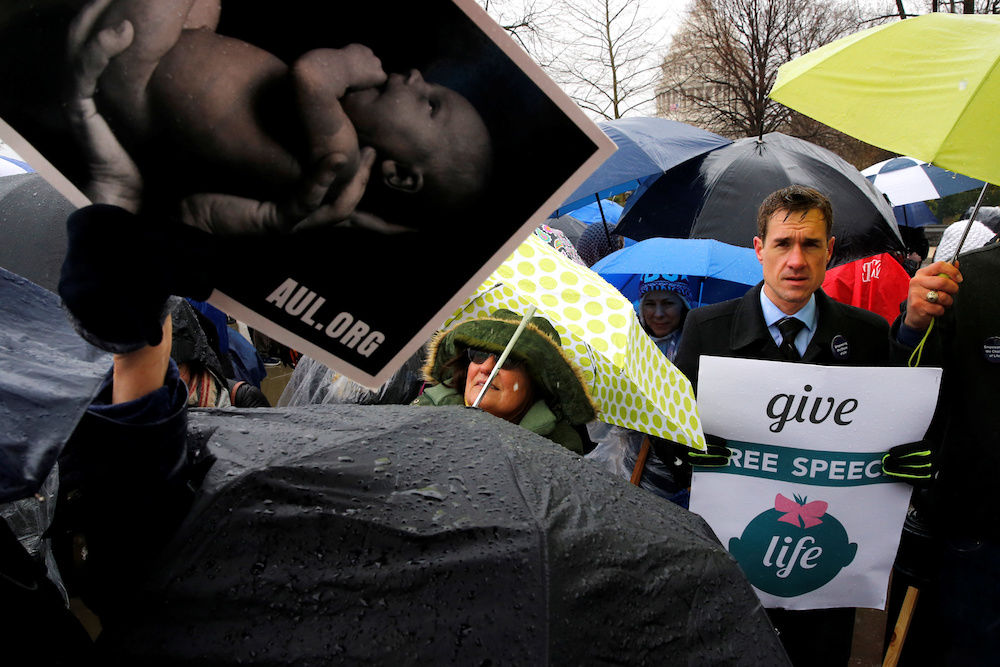Last Tuesday, the U.S. Supreme Court heard a case involvingrnthe compelled speech of pregnancy clinics and centers here in CA. They reviewedrnthe 2015 ReproductivernFACT Act, a law that requires pro-life pregnancy clinics to postrninformation detailing how women can obtain free or low-cost abortions andrnrequires pro-life pregnancy resource centers to post notices that they are notrnlicensed medical clinics in the state of CA.
Much has been writtenrnin religiousrnand secular pressrnabout this case and its implications for the pro-life movement. At stake is notrnjust compelled language for a particular group of people, but when and whetherrnthe state can force nonprofit organizations to violate their missions andrndilute their message to the point of obscurity. Counsel for NIFLA, representingrnthe clinics/centers, are hopeful SCOTUS will overturn the law, based on favorablernresponses during the hearing.
In the meantime, the prominence this issue brings to these clinics/centersrnoffers us an opportunity to do some soul searching of our own. Pregnancyrnclinics/centers are integral to the pro-life movement, and by extension ourrnparishes, yet how many of us are actively involved with them? Have you everrnvisited one? Do you know what is done there? Have you ever referred a woman orrnfamily in need to a pregnancy clinic/center? Would you?
It may surprise some people to learn that there are close torn90 pro-life pregnancy centers and clinics in Southern California. Women andrnfamilies in need are welcomed, respected and provided material resources asrnwell as referrals for healthcare, housing, education, employment, childcare andrnother services.
Perhaps their greatest benefit is accompaniment. In ourrnfrenetic culture, abortion at the earliest possible moment is seen as the bestrnsolution. Instead, pregnancy clinics/centers provide women with a safe place tornpause, take a breath, and talk through what they really want and what it wouldrntake to get there.
Steve Karlen of 40 Days for Life, speaking at a luncheonrnlast week in LA, told a story of a mother of four, pregnant with child numberrnfive, who was heading into a clinic to seek abortion. She ran into a 40 Days volunteerrnwho also had five children, and the two women struck up a conversation. At thernend, the pregnant mom decided to keep her child, thanks to the witness of thisrnother mother.
This encounter is not atypical. According to statisticsrnavailable from GuttmacherrnInstitute, 59% of women who experience abortion have at least onernchild already; 75% are poor or low-income; and 85% are unmarried. Thernpopulation of women seeking abortion today is changing, and pregnancy clinics/centersrndo well to anticipate and meet their needs.
At a recent gathering of pregnancy clinic directors, werndiscussed this changing dynamic. The directors agreed that they are seeing manyrnmore women who already have children and that housing is the number one concefor the pregnant women and families they serve. The housing crisis makingrnheadlines throughout Southern CA has disastrous ramifications for women who arernexpecting children, and is very often the driving factor to despair andrnabortion.
Pregnancy clinics/centers with homeless clients try to findrnspace at maternityrnhomes, but they are few and far between, often with long waitingrnlists. And many don’t take kids. Waiting for Section 8 housing, or evenrnresources through 211, is often not an option for pregnant women whose needsrnare immediate.
So, what can we do?
I offer one shining example among many. PregnancyrnPathways, an exemplary pilot program in Edmonton, Canada, began whenrnERs were seeing large numbers of pregnant women arriving in labor, havingrnreceived no prenatal care living on the streets. The program offers supportivernhousing with resources these moms need to thrive. Pregnancy Pathways received arnhuge boost when a landlord heard, in a radio interview, that the program was inrnneed of housing and decidedrnto donate his 18-unit building to help moms in need.
Taking a cue from Edmonton, let’s adopt the idea thatrnhelping pregnant women and families living at the poverty line is a jointrneffort. Pregnancy clinics/centers should not bear this responsibility alone.rnGet to know your local clinic/center. Go visit. Find out what they do. Morernimportantly, find out what they need. You might just have the referral or thernresource that they could offer to a mom that would lift her burden and allowrnher to say yes to life.
Fighting legislation that damages pregnancy centers andrnclinics is a good fight. We pray for the success of those efforts. Equallyrnimportant is the local, on-the-ground collaboration that builds up a communityrnand offers a social safety net, provided by the people of God, to moms andrnfamilies in need.
kathleen-domingo is director of thernOffice of Life, Justice and Peace for the Archdiocese of Los Angeles.

